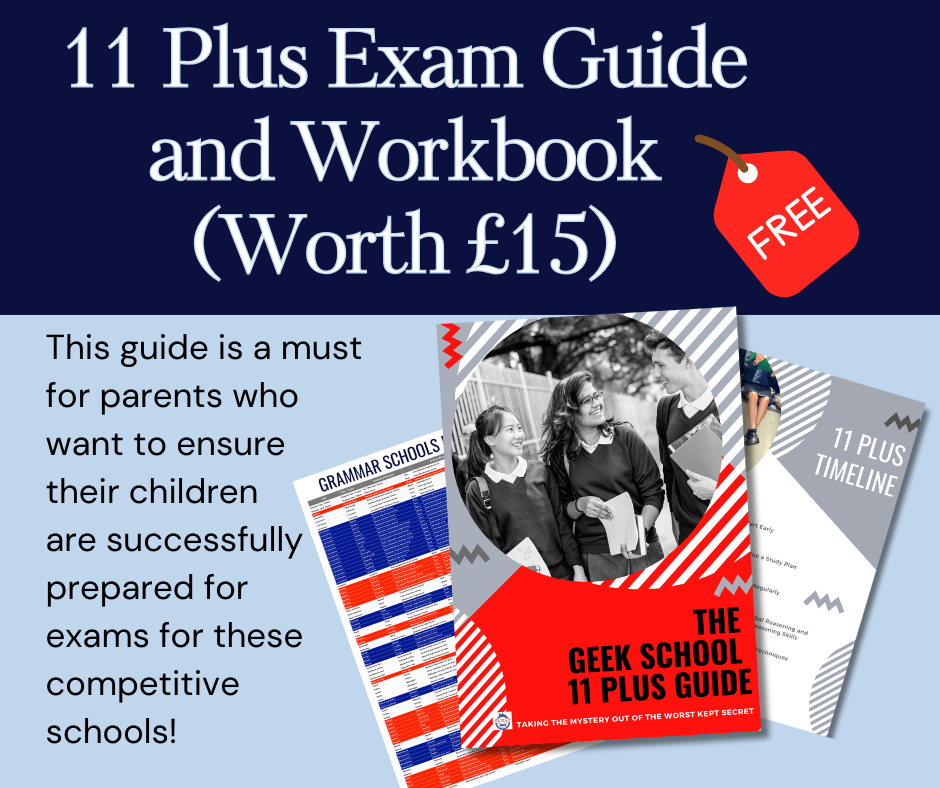The Geek School Blog
Your Complete 11 Plus Exam Success Resource
Join 1,000+ parents getting expert 11 Plus and independent school insights from us, curated by Geek School Tutoring’s managing director, and journalist, Joycellyn Akuffo. Get free exam timelines, tips on helping your child to pass these competitive exams, and exam strategies that actually work, from the actual 11 Plus exam experts.
1,000+
Successful Students and Growing
98-100%
Grammar and Private School Pass Rate
-

Why More and More UK Parents are Investing in Private Tuition for 11 Plus Exams
As a UK parent, you want the best for your child, which often includes getting them into a top grammar or independent school. With the increasing competition to secure a place, more and more parents are turning to private tuition to give their children an edge in the 11 Plus exams.
-

11 Plus Exam Success: How 11 Plus Creative Writing Can Give Your Child an Edge
When it comes to preparing for the 11 Plus exam, creative writing might not be the first method that springs to mind – but it could just set your child apart from other candidates. Having the ability to write persuasively and creatively can make all the difference in the highly competitive realm of 11 Plus
-

What Are Verbal and Non-Verbal Reasoning Tests, and How Are They Used in Cognitive Ability Tests?
Verbal reasoning, also known as verbal ability, is the ability to understand and use language. This includes both the comprehension of written text and the ability to produce oral language. It’s one of the critical areas measured in cognitive ability tests. Non-Verbal Reasoning is the ability to understand and use non-verbal communication. This includes both
-

Nine Top Tips to Help Your Child Ace Their Year 6 CAT Tests
Are you worried about your child’s upcoming CAT tests? These nine top tips help them ace the exam and boost their confidence. From preparing for the test itself to staying calm and focused on test day, we’ve got everything you need to help your child succeed. 1. Help them to understand the test format The
-

Are you looking for a fun and engaging way to help your child build their vocabulary? Word games might be just the thing!
From traditional board games like Scrabble and Boggle to online and app-based games that can be played on a phone or tablet, there are plenty of options to choose from. And the best part is, your child will have so much fun playing these games that they won’t even realise they’re learning! So how can
-

11 Plus Exam Preparation In Year 5: From January to August
As you embark on the journey of preparing your child for the 11 Plus exams, it can be a daunting task. However, your child can excel in these exams with the right guidance, support, and resources. This monthly 11 Plus preparation guide provides you with a comprehensive and expert plan to help you and your
-

The Value of Prefixes and Suffixes: How to Build Vocabulary by Understanding Word Parts
Prefixes and suffixes are word parts that are added to the beginning or end of a word to change its meaning. For example, the prefix “un-” can be added to the front of the word “happy” to form the word “unhappy.” Knowing common prefixes and suffixes can help your child figure out the meanings of
-

The Importance of a Dictionary: How to Build Vocabulary Using a Dictionary
A dictionary is an invaluable tool for building vocabulary, and it’s never too early to start using one. A dictionary can help your child learn new words, understand their meanings, and see how they are used in context. So how can you encourage your child to use a dictionary and build their vocabulary in the
-

The Power of Reading: How to Build Vocabulary Through Reading
As a parent, you know that reading is vital to your child’s education. But did you know that reading can also help your child build a strong vocabulary? When children read, they are exposed to a wide range of words and contexts in which they are used, which can help them learn new words and
-

Exams Required for Admission to Independent Schools in the UK: An Overview
Are you a UK parent of a pupil who is looking to gain admission to an independent school? If so, you may be wondering what exams your child will need to take as part of the admissions process. In this article, we will provide an overview of the exams that are commonly required for admission

